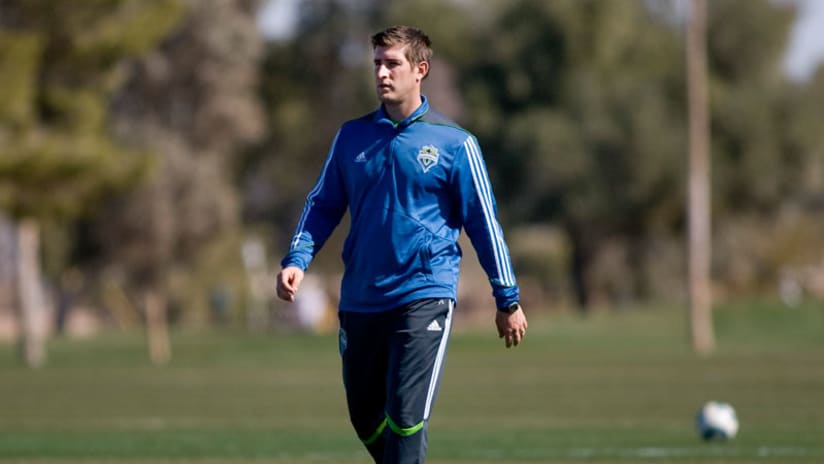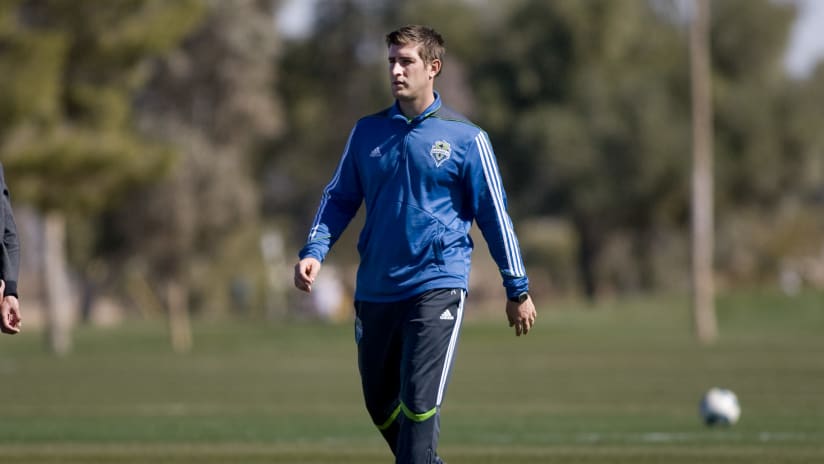Kurt Schmid doesn't see the game exactly how his father does, but his vision has been shaped by Sigi Schmid.
Sounders FC assistant coach and scout Kurt Schmid has piled up the frequent flyer miles and passport stamps in the last couple of years flying around the world to scout players.
When the teams in the league submitted their discovery lists last month, setting the groundwork for potential off-season signings, Schmid scanned the list of 25 players who were submitted by multiple teams. With an uncanny accuracy, he recited information about each to the rest of Seattle’s staff in the room.
“Of those 25 players, I probably knew two of them and Kurt knew all but two and he immediately found out about those two,” Sounders FC head coach Sigi Schmid said.
With that travel and with the video that he watches every day, he has developed a near encyclopedic knowledge of potential Major League Soccer players from far and wide.
Schmid spends much of the summer in Seattle working with Seattle’s reserves while the club is on the road, but once August and the college season starts, his travels begin.
Fortunately though, he doesn’t mind packing a suitcase for a week at a time away from home, knowing that on each part of the trip he gets to do something that he loves – watch soccer.
“I’ve been all over - Trinidad, Jamaica, Honduras, Guatemala, Costa Rica, Tanzania, Spain. In the college season, I’m all over the country, so there’s a little bit of travel,” he said. “I enjoy travel, so it’s not a bad part of the job. It is always nice to get back home though.”
Once home, he gives reports to the coaches in person and through a scouting database the club uses. Thus continues Seattle’s ever-evolving evaluation of players that the club may look to sign or draft.
Few would have a better idea of the type of player to fit Seattle’s club than Kurt Schmid, which is one reason why his father hired him as an assistant just before the start of the 2009 season.
“It’s always a difficult thing when you recommend your son as a possible hire,” Seattle’s head coach said. “I know that he has a very good eye for players and he demonstrated that in his coaching career prior to coming to Seattle. He does an immense amount of work.”
When scouting MLS talent, it’s never necessarily finding the best player. Often finances become a factor because of the league’s restrictive salary cap. Because of that,
“There are a lot of things beyond talent level that make a player right for the league,” Schmid said. “It’s age and contract status and the league he’s coming from and we’re always looking at ways to narrow those things down.”
Kurt Schmid is in a position that was unique in MLS when he was hired.
Before coming to the Sounders, he had an eye toward climbing the college coaching ladder, working as an assistant coach for St. Mary’s and UC-Irvine, along with youth clubs in California. Coupled with his time at Wake Forest and UCLA during his playing days, he spent plenty of time developing his own coaching style and eye for talent, separate from that of his father.
However, that doesn’t erase the years prior to that, when he and his father spent so many hours playing and watching soccer or discussing different elements of the game.
“I spent a lot of years as a fly on the wall in a lot of meetings different offices and different conversations. From a subconscious level, my opinions were formed from the things I heard from him and the other people in the conversation,” Kurt Schmid said. “We spent enough time apart too where we don’t always agree. We’ve had many disagreements over many topics throughout the years. I know when to push it and when not to push it. In general, though, we are pretty similar in coaching philosophy and styles of play.”
That experience coaching at the college level has helped Schmid relate to the younger players on the team, particularly in those training sessions while the first team is away on a road trip and he is working with Ezra Hendrickson to keep them in tune for the next playing opportunity.
And while he has enjoyed the on-field elements of the profession, the scouting is where he’s found the most enjoyment.
“It was important for me to maintain the coaching aspect and be able to be on the field and continue my coaching education,” he said. “The scouting aspect took on a life of its own and became prominent and more important. I enjoy that.”




